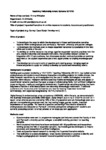Expanded Narrative: An on-line resource for students, lecturers and practitioners
| dc.contributor.author | Whittaker, Emma | |
| dc.date.accessioned | 2018-08-24T08:46:56Z | |
| dc.date.available | 2018-08-24T08:46:56Z | |
| dc.date.issued | 2012 | |
| dc.identifier.uri | http://hdl.handle.net/10026.1/12194 | |
| dc.description | File replaced (incorrect version) on 12/7/22 by KT (LDS) (1.4) | |
| dc.description.abstract |
To investigate the ways in which the development of linear and interactive narrative features within undergraduate arts curricula at Plymouth University and partner colleges. To investigate the methods used to create expanded narratives by specialists in the field, within and outside of the arts. To develop an on-line resource that brings together expanded narrative practices from the arts, creative industries and research institutions, that provides relevant content for integration with HE arts curricula, that showcases student work and provides an evolving document of the student experience and offers opportunities for sharing knowledge and skills. The development of a community of practice and steering group - bringing together interested parties to apply for funding to develop symposia and networking events. Building upon a project funded by a HELP CETL Teaching Fellowship (2010/11) that looked at how undergraduate arts students could develop interactive storytelling projects for mobile phones, the initial research was driven by an investigation into the use of mobile technologies in narrative practices within the arts. Research demonstrated that mobile technologies are just one aspect of experimental narrative practices that span a range of collaborating fields, from artificial intelligence to performing arts, media arts and game development. Experimental narrative practices that have long been a feature of artist-lead projects are becoming increasingly mainstream. Traditional publishers and media production companies are now harnessing ‘Expanded narratives’ commercially, with expertise recognised by BAFTA (Horne 2011). Digital literacy is understood as a key competency (BIS2009), within the arts, as demonstrated in the Business Innovation and Skills 2009 report Digital Britain. According to Ofcom’s October 2011 report, smart phones are now owned by 49% of the UK population and are increasingly seen as a platform for experiencing entertainment, be that moving image, games, novels, theatrical experiences or tour guides. Yet there is a question concerning if this trend is reflected in undergraduate arts education at Plymouth University and partner colleges and if students are currently producing content for smart phones or for cross-platform application. | en_US |
| dc.description.sponsorship | TFAS | en_US |
| dc.language.iso | en | |
| dc.publisher | University of Plymouth | en |
| dc.subject | narrative; curriculum development; technology | en_US |
| dc.title | Expanded Narrative: An on-line resource for students, lecturers and practitioners | en_US |
| dc.type | Report | en_US |
| plymouth.date-start | 2011-2012 | en_US |


